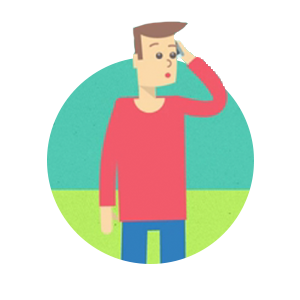Therapy for Anxiety: Reducing Anxious Thoughts and Feelings
Aly has grown more and more anxious at work. She just started her new job a month ago, after being a stay at home mom for 10 years. Aly isn’t sure how to properly navigate this role change.
She talked to a few people in the cubicles next to her but quickly assumed they felt sorry for her. So, she’s stayed quiet since and keeps her head down. She hates the idea of people looking at her and judging her.
Tyler, Aly’s husband, worries about Aly and encourages her to speak with a counselor about her anxiety at work. Hesitant, she agrees. After a few sessions, she starts to feel more confident in social settings, specifically at work.
Aly’s counselor helps her identify and alter her negative thoughts. For example, her assumption that everyone felt sorry for her. Now, Aly goes out of her way to greet her coworkers in the morning with a big smile. She still attends anxiety counseling and is excited to continue to dismantle her anxious thoughts.
What Is Anxiety?
What’s life without the occasional anxiety? You might feel anxious when a problem arises at work or when you get into an argument with a friend. This is to be expected. But there’s a big difference between feeling anxious or worried sometimes and suffering from a serious anxiety disorder.
Anxiety disorders are more than temporary worry or fear. They are medical conditions that can interfere with daily life such as job performance, school, and relationships.
According to the Anxiety and Depression Association of America, anxiety disorders are among the most common mental illnesses in the US. Approximately 40 million US adults (18.1% of the population) experience an anxiety disorder each year.
This statistic is concerning but it also shows that if you are struggling with anxiety, you are in good company. Anxiety is common and it’s also treatable. If you are experiencing symptoms of an anxiety disorder, you should seek treatment such as anxiety therapy.
Common Anxiety Disorders: Social Anxiety, PTSD, and More
As previously mentioned, there are different types of anxiety. These include:
- Generalized anxiety disorder
- Post-traumatic stress disorder (PTSD)
- Social anxiety disorder
- Obsessive-compulsive disorder (OCD)
- Panic disorder
- Agoraphobia
- Specific phobia
These specific disorders vary in presentation and severity. Generally, a person with a diagnosable anxiety disorder experiences more intense symptoms than brief anxiety, like excessive fear or dread.
Anxiety disorders can, and often do, occur alongside other mental or physical illnesses. And some co-occurring problems, such as depression or addiction, have the potential to mask anxiety symptoms. In some instances, like in the instance of substance abuse, the co-occurring problem will need to be treated first.
Causes of Anxiety
While anxiety disorders sometimes run in families, no one knows for sure what causes an anxiety disorder. Indeed, the cause might be multifaceted, meaning that some anxiety disorders may emerge for a couple of reasons. They may occur due to…
- One’s environment: For example, an individual might develop social anxiety due to a bad experience in a large crowd, for example.
- Genetics, whereas one’s genetically susceptible to anxiety.
Studies investigating biological factors have found that several parts of the human brain are involved in fear and anxiety. In addition, ongoing research regarding environmental factors continues to develop, offering further explanations for causes of anxiety.
In fact, there is a sentiment among researchers that evolutionarily (or biologically) a human body is designed to live life at a much slower pace and with less stimulus change. The simple fact that our environments are so different today from past lifestyles could be the root of our anxiety.
Anxiety Treatment: Therapy Can Help
There is good news: anxiety disorders are treatable. In fact, anxiety therapists specialize in treating anxiety. These professionals work to understand what may have caused the individual’s anxiety disorder and help them manage or even eliminate it. They can also offer relaxation techniques as well as coping skills and also help their clients find anxiety support groups.
There are different types of therapy for anxiety, but a common approach is cognitive behavioral therapy (CBT). This method can be useful in treating a number of mental health issues including mood disorders (such as anxiety).
CBT’s aim is to help the individual change thinking patterns that produce negative emotions (such as anxiety) and thereby change the way they react to anxiety-provoking situations. For example, CBT can help someone with panic disorder learn that his or her panic attacks are not heart attacks, which is a common misconception. It can also help a person with social phobia learn how to change the false belief that others are always watching and judging.
Further, CBT can utilize exposure therapy, which is often used to treat specific anxieties or phobias. In exposure therapy, the individual gradually encounters the feared object or situation (such as a spider, snake, germs, or small space).
Who Should Seek Anxiety Therapy?
If you think you have anxiety and need help managing it, you could benefit from working with an anxiety counselor. Keep in mind, as you embark on this journey, that response to treatment can vary.
Recovery doesn’t always follow a linear path to healing. More often, people will experience their recovery as cyclical. This is a “two steps forward, one step back” motion. You might feel better, then somewhat worse, then better, and so on.
Unfortunately, when results are not immediate or regression occurs, some people believe they have “failed” at treatment or that it didn’t work for them. In reality, the person simply needs more time for treatment to prove effective.
Also, sometimes a person must try different treatments before they find what is effective for them.
Quick Facts About Anxiety
- CBT may be conducted individually or with a group of people who have similar problems. Group therapy is particularly effective for social phobia, as the client can encounter and confront some social issues in treatment.
- Talking with a trusted friend can also provide support, though it’s not usually a sufficient alternative to professional care.
- Stress management techniques, like meditation, can help soothe anxiety and may greatly enhance the effects of therapy.
- Regular exercise has been shown to reduce stress and anxiety levels.
- Sufficient sleep can help one reduce their anxiety. Often ignored, the impact of adequate sleep can be substantial.
- Caffeine, alcohol, and certain illicit drugs can provide temporary relief from anxiety. However, they’re generally considered to be unhelpful for long-term anxiety management and may produce other negative outcomes. Some over-the-counter cold medications can also aggravate the symptoms of anxiety disorders.
- One’s family can be an important asset in the recovery of an anxiety disorder. Ideally, one’s family should be supportive, but not enable, their loved one’s symptoms.

















